Breckenridge Outdoor Education Center (BOEC) participants come from all walks of life. They come to us from all over the world, of all ages, and with a wide array of disabilities and special needs to experience the life-changing effects of our outdoor programs. One disability that is not usually on our radar these days, however, is post-polio syndrome. Bonnie Kittle, a New Jersey native and polio survivor, skied with us for the first time on her 70th birthday this past December. This is her story of surviving the epidemic, living a very fulfilling life and experiencing something that she never thought possible.
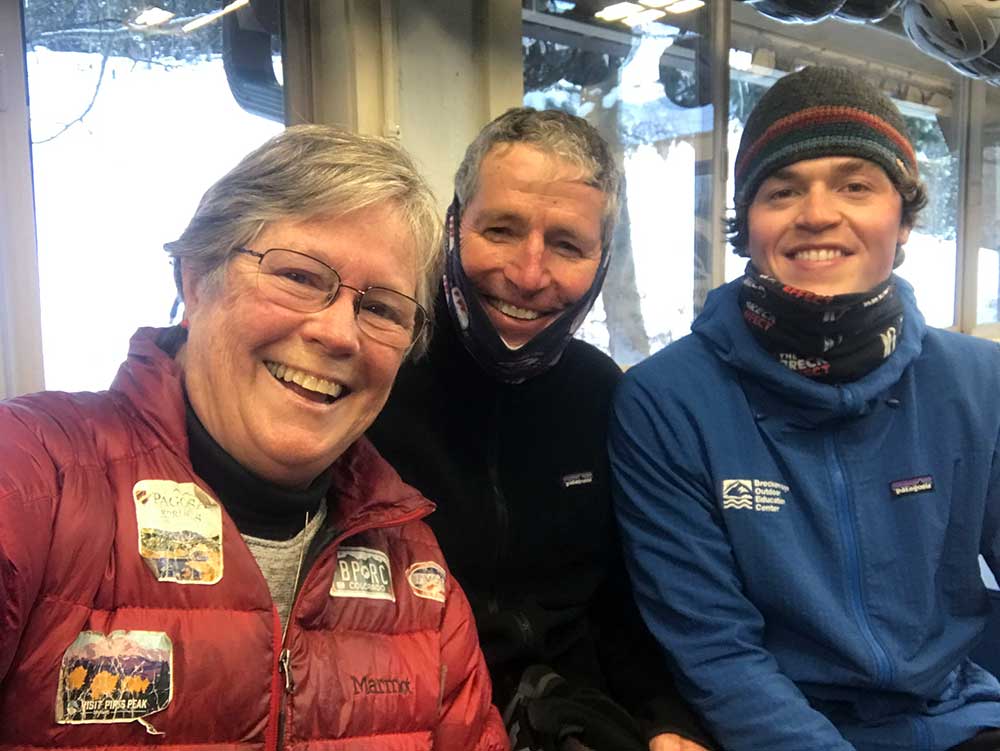
Bonnie (left) with her KAC crew for the day; Jim Vogel (center) and JR O’Neil (right).
At just two-years-old, Bonnie contracted the disabling and life-threatening disease caused by the poliovirus. It was 1952 and the area around New York City, where Bonnie lived, was in the midst of a surge in polio cases with nearly half of them resulting in its patients being paralyzed and even dying. While the polio virus can attach itself to any part of the body, Bonnie considers herself one of the “lucky” ones because she “only” contracted the disease in her right leg. Due to the fact that she was only two at the time, and naturally doesn’t remember very well, she calls on the memories of her mother as to what exactly happened.
“From one minute I was walking and the next minute I was not,” she recounts her mother’s experience. “There was, of course, a panic and my parents took me to the hospital where I was diagnosed with polio. As a child, I spent quite a bit of time in hospitals and at one point I was hospitalized for about six months.”

Bonnie (left) as a child.
Bonnie was fortunate enough to be born into a family of medical professionals while being raised in the suburbs of New York City, giving her access to quality medical care and therapy that a lot of other people living with polio didn’t have at the time. There’s no cure for the disease once you have it, however, so Bonnie was forced to rely on consistent physical therapy sessions to keep mobile. When she was 12, surgery was performed on her left leg to keep it from outgrowing her right leg, but complications resulted in problems with that leg as well, leaving her with two semi-functional legs as a result. But Bonnie and her family wouldn’t let that stop them from being positive and supportive of the situation.
“People who had polio in their chests were much worse off than I was because they had to be in iron lungs,” Bonnie compassionately says. “That was really, really different from me and I was lucky that I had parents who really knew to push and encourage me to just go out and do what I could do.”

Bonnie enjoys some time at work.
But there were some things that she simply could not do because of the lack of strength in her legs. Her family would go on ski vacations each year and Bonnie would miss out on the festivities to her dismay. Instead of hanging her head, though, Bonnie eventually took up horseback riding, but skiing with family wasn’t meant to be.
As Bonnie matured, whether it was directly due to her condition or not, she set her mind to helping others … first as a volunteer in the Peace Corps before entering a career as a public health advisor. After obtaining degrees from Bethany College in West Virginia and The School for International Training (SIT) in Brattleboro, Vermont, at age 22 she started a 45-year journey as an international public health advisor that would ultimately take her around the world. She traveled to third world countries, first counseling community members directly; then providing technical assistance to non-governmental organizations (NGOs) on how to improve the health of mothers and children. She spent 20 years living and working in Africa, the Caribbean, South Asia and South America, and another 25 years training NGO staff in various developing countries. Bonnie had found her passion in helping others help themselves.

Bonnie working as an international public health advisor.
“My passion is to help people live healthier lives and my focus was on mothers and children,” Bonnie says. “They’re the most vulnerable, and because of my Peace Corps experience I decided to focus on third world countries. It’s super rewarding because I was doing something that’s really important and people really appreciate the work that one does in this field.”
While working in Burkina Faso in the 1970’s, Bonnie met her husband abroad and the couple eventually had two children, Andrew (35) and Jason (33). The family traveled across the world and experienced things that most of us only dream of. Things were good.
Fast forward 45 years, and at age 65, Bonnie decided to hang up her passport and retire from her life-long career. Now it was time to switch gears and let others help Bonnie do what she did for so many others her entire life … live her healthiest life. But, as is the case with post-polio syndrome, the muscles in her leg continued to atrophy as she aged, so she added a set of leg braces to her arsenal, giving her a lot more stability and generally making it much easier for her to get around.
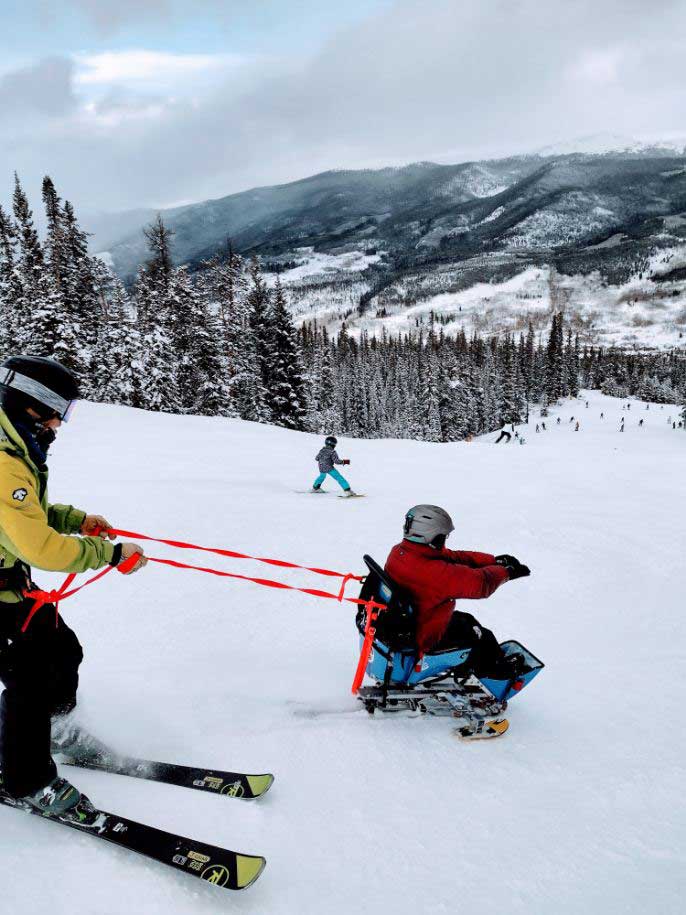
Heading down the hill in her bi-ski.
“During your life there’s only so much you can do to make them (muscles) stronger,” says Bonnie. “You can exercise a little bit, but unlike most people where they say use it or lose it, that doesn’t apply to people who have polio. You can exercise too much and then you will lose it! That’s why I tell my boys that I’ll probably end up in a wheelchair because those muscles are going to make it so that I can’t walk even with the braces.”
While a wheelchair might be in Bonnie’s future, she doesn’t focus on such things and instead sets her sights on what she can control. The 70-year-old now lives in her RV and travels around the country, spending at least a month exploring each state, a feat she will finish by the end of this summer. She also makes Andrew and Jason a priority, visiting them in Denver every year for the holidays. And that’s where this story takes a unique and pleasant turn.
This past December, for her septuagenarian birthday, Andrew decided to do something special for his mother, something the entire family could enjoy. Knowing that she could never join in on the family ski vacations as a kid, he made this idea come true with BOEC’s program at Keystone Ski Resort, the Keystone Adaptive Center.
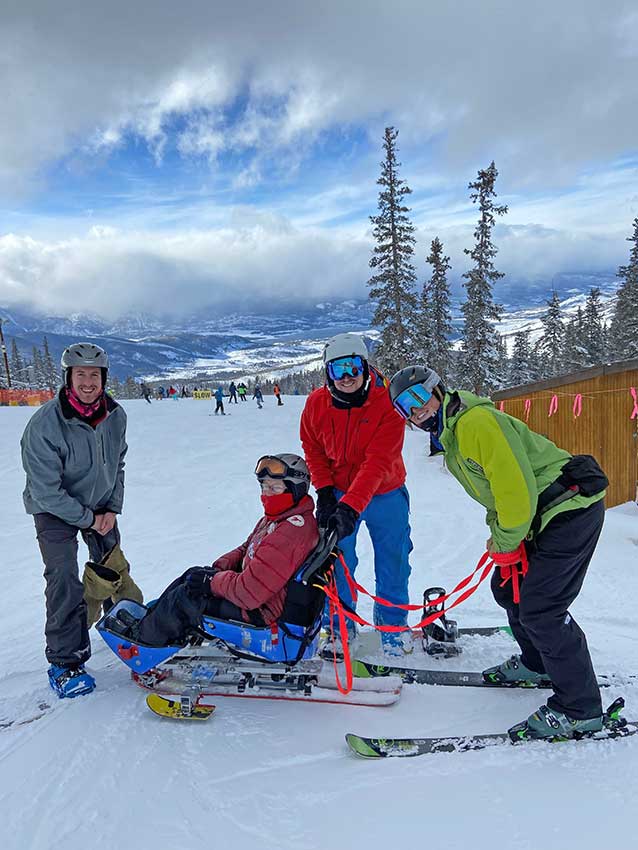 “My brother and I live a pretty active life, and while my mom does pretty well for her condition, she’s never really been able to join us on anything like skiing and snowboarding,” says the Golden Fire & Rescue volunteer firefighter. “I used to work for Vail so I knew about adaptive skiing and I looked into it for her 70th. It was reasonably priced so we decided to go for it.”
“My brother and I live a pretty active life, and while my mom does pretty well for her condition, she’s never really been able to join us on anything like skiing and snowboarding,” says the Golden Fire & Rescue volunteer firefighter. “I used to work for Vail so I knew about adaptive skiing and I looked into it for her 70th. It was reasonably priced so we decided to go for it.”
“He was super excited about this because he’s a snowboarder and he loves going out on the mountain,” says Bonnie about Andrew’s gift. “He asked if this was something I would be interested in and I told him it wasn’t that high on my list of things to do, but ‘ya know it might be fun.’”
And fun – or more than fun – it was as Bonnie exclaims, “It was awesome! It was just fabulous. I loved every minute of it and the guides (JR O’Neil and Jim Vogel) who helped me were just awesome. It was just really, really great!”

Waiting in line for the next chair.
One of her guides, BOEC Volunteer Jim Vogel, echoes the sentiment, “It was pure joy for Bonnie, a polio patient at the age of two, to celebrate her 70th birthday by skiing for the first time ever! And icing on the cake, she did so with her two sons!”
Before taking the plunge, Bonnie had an idea in her head of what the experience might be like, but “boy was I wrong,” she said. She envisioned going real slow down the bunny slopes, kind of like tubing, but in a “sled type thing” as people helped her down the mountain. While she was partly correct in terms of people helping her down the hill, what she experienced was nothing like she envisioned.
“We went really fast going down the mountain zoom zoom,” she remembers. “I thought it was super fun going back and forth over a bunch of moguls and even catching air a couple of times. It was nothing like I expected beforehand.”
And, even more importantly, she finally got that family ski vacation that had to be put on hold so many years earlier.
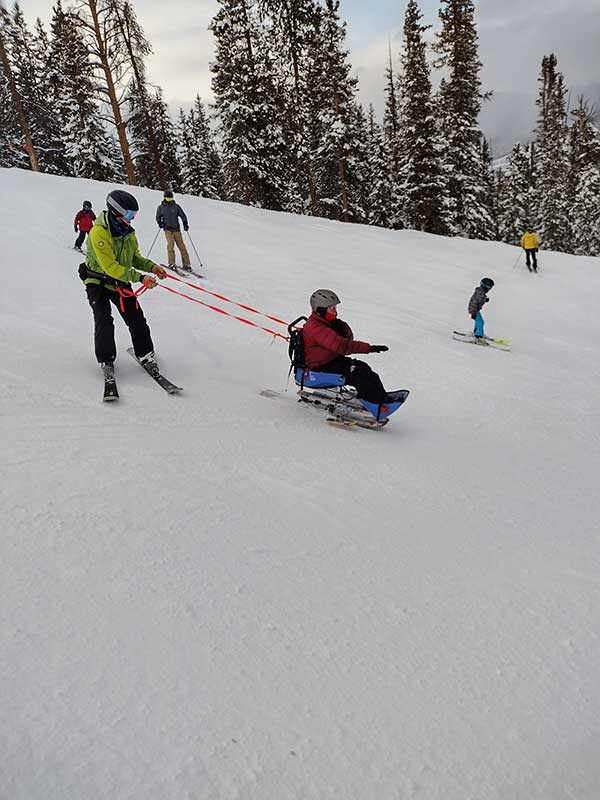
Wide open terrain for Bonnie and JR.
“It was super cool that my boys got to board alongside me,” she says. “It was like we were going as a family for the first time! I am so very grateful that they thought it was really important to do something special and fun for my birthday and that they provided this experience for me.”
“It was really cool for both my brother and I to share that experience with her,” adds Andrew. “It was a blast. And it wasn’t like some Mickey Mouse experience either. The instructors were top-notch and from start to finish everything was really well put together.”
“Just being on top of the mountain being able to see all the mountains around me was just spectacular,” says Bonnie thinking back on her experience. “You don’t get to see that very often. And the fact that my boys were able to be with me the whole time, and that I was able to watch them board for the first time, was super fun. It was great to have an insight into what life is like for them when they tell me they’re going out to the resort and go boarding.”
As you can tell, Bonnie isn’t afraid to throw caution to the wind and overcome her disability in any way she can. From volunteering with the Peace Corps to a 45-year career traversing the variable terrain of third world countries to hopping in a sit-ski and attacking the slopes of Keystone, it’s only natural then that she would name the hypothetical book of her life, Go For It! The idea being don’t let physical limitations dictate what you can and can’t do.
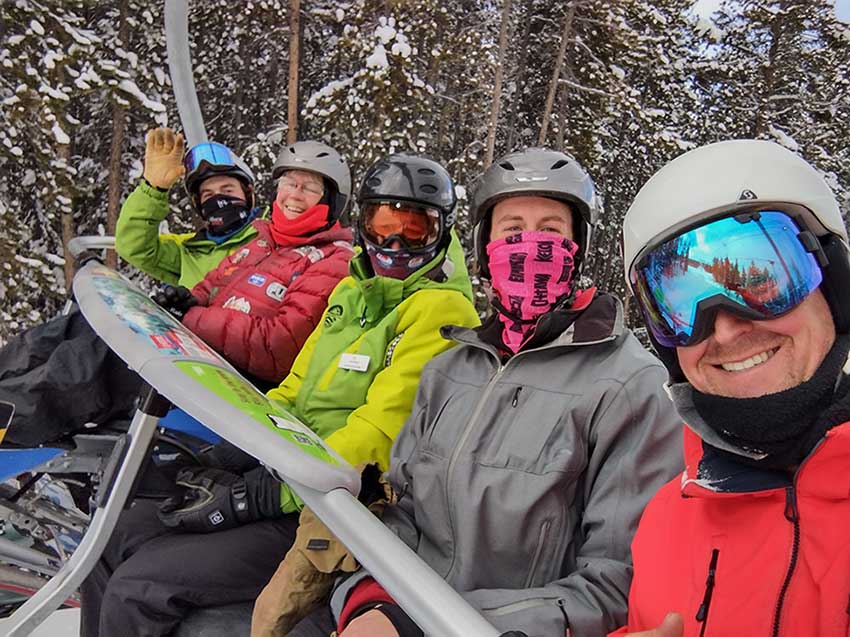
Heading up the chairlift for another run.
“That’s what my parents always encouraged in me and that’s what Andrew was doing,” she says. “Andrew was saying ‘Hey mom, here’s a way for you to be on the mountain, so just go for it!’ I could have easily said no to him, but that would’ve been really disappointing because I would have missed out on an incredible opportunity.”
So, the BOEC has made a believer out of Bonnie and her family. Not only does she think this will become a yearly holiday tradition, she speaks to others in a similar situation that might be hesitant to get out on the hill with us.
She says, “Just go do it! You feel very, very safe and the guides are very skilled, knowledgeable, calm and collected, and just really fun. And it’s wonderful at age 70 that you can look forward to learning something new and having such a really new experience. That’s a really cool thing.”
It looks like we’ll be seeing you again this December, Bonnie and family. Until then, keep being an inspiration to all of us and all those that are facing similar challenges as you.
To learn more about BOEC’s Adaptive Ski & Snowboard Program, or to schedule a lesson, click here.


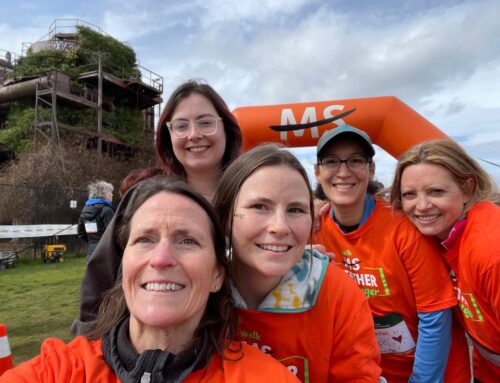
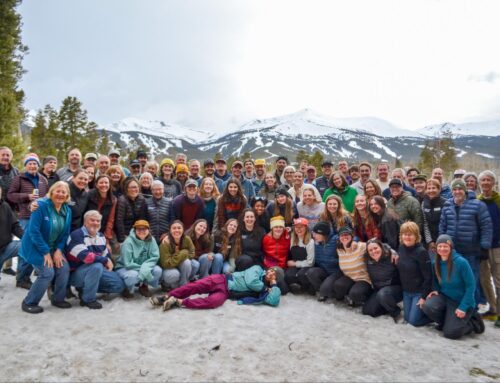

Leave A Comment